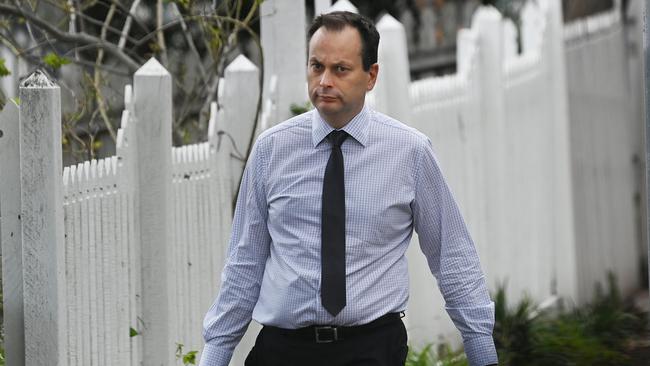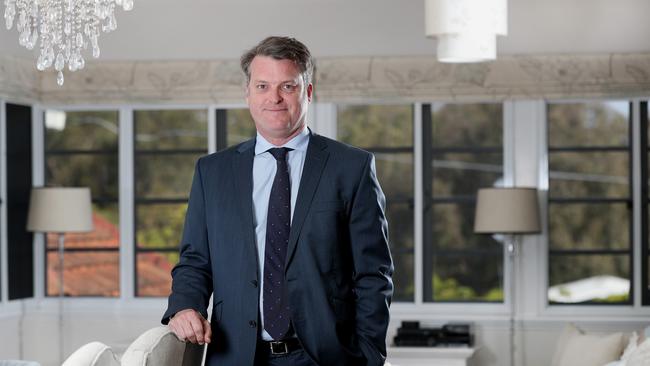Queensland election: Money talks power and party favours
Political lobbying has cast a shadow over the Queensland election.

It has become the business model of Queensland politics.
The rise of the campaigner-lobbyist: a growing band of cutthroat political strategists and operatives who help secure power before putting a price tag on access to it for their business clients.
Labor and the Liberal National Party have become increasingly reliant on these guns for hire to vet candidates, spread dirt on rivals and run their election campaigns.
Some are former MPs and candidates, others have been party officials or ministerial staffers who have played critical, behind-the-scenes roles over the past decade to help their parties take or retain office.
The pay-off is in the bulging client lists, unrivalled access to decision-makers and lucrative government contracts they receive if their side wins.
Despite the apparent integrity issues, the cozy, lucrative relationships between “party mates” in a state, where corruption was rampant during the Bjelke-Petersen government era of the 1970s and 80s, is flourishing, unchallenged.
Queensland’s lobbyist “code of conduct” is weak and unenforced, overseen by an Integrity Commissioner that has no power to investigate alleged wrongdoing.
But neither the Palaszczuk Labor government, nor the LNP opposition appear to have the appetite to do anything about it.
Already this year, the brutal March 28 election fight for the keys to Brisbane’s city hall — Australia’s largest council — was shaped in the shadows by a handful of lobbyists and lobbying firm owners on both sides.
One of them, Malcolm Cole — co-owner, with federal Nationals party president Larry Anthony, of lobbyist and communications firm SAS Consulting — was even signed up to a ratepayer-funded job as a “special adviser” to LNP mayor Adrian Schrinner while running his ultimately successful bid for re-election.
Cole’s firm is now lobbying the council on behalf of clients and LNP donors, even as he remains on the mayor’s payroll.
The campaigns in the past three state elections — which has seen power switch from Labor to the LNP and back to Labor — has also been dominated by lobbyists.
And as the knife-edge October 31 state elections looms, an investigation by The Australian and The Weekend Australian — published in a series of reports over the past two weeks — has revealed lobbyists are again lining up to lead the politicians from behind into electoral battle.
The investigation found that the state’s two current “go-to” lobbyists — Evan Moorhead and David Nelson — are on a monthly Labor retainer to provide campaign advice and conduct focus-group analysis.
Moorhead ran Annastacia Palaszczuk’s successful re-election campaign in 2017 as ALP state secretary before taking a job in her office. When he quit as the Premier’s government strategy chief just ahead of the May 18 federal election, he sent a prescient email to friends and colleagues.
“As you all know, I’ll never be far away from Labor politics in Queensland,’’ he wrote.
Within weeks, Moorhead set up Anacta Strategies — touted as a “specialist campaigns, strategy and government relations firm” — with Nelson, who has been involved in federal, state and council Labor campaigns for years.
Palaszczuk even officially launched Anacta — which had been given rent-free office space by Labor-leaning law firm Holding Redlich — at a party attended by Labor frontbenchers.
Working on the federal Labor campaign in Queensland, the plan was for Anacta to capitalise on Bill Shorten’s expected win. Labor lost to Scott Morrison but there was still fertile ground, given their connections, for the pair on the state political landscape.
Since then, the firm has become the hottest lobbying outfit in town, securing 32 clients and enjoying a rush of new clients as the election nears; last month signing up two companies a week.
Among the clients, which include those with government contracts or vying for state work, are companies Moorhead dealt with as a staffer in the Premier’s office, including major law firm Maurice Blackburn and train manufacturer Downer. Moorhead’s firm was lobbying for Downer and providing “professional services” for Queensland Rail when the government authority and Downer signed a $300m, 10-year deal.
During the week, Moorhead told The Weekend Australian he has always strictly followed the lobbying rules. Under the Integrity Act, lobbyists in Queensland are banned from carrying out lobbying — activities “relating to (their) official dealings as a government representative’’ — for two years after they leave their taxpayer-funded jobs.
The laws were passed in 2009, enshrining the lobbyist ”code of conduct”, following outcry over revelations in The Australian of “success fees” of up to $1m being paid to politically connected lobbyists who had helped secure financial wins for their clients.
At the time, Tony Fitzgerald — who spearheaded the inquiry into corruption in Queensland in the late 80s — broke his silence after 20 years to warn of the practice and the pervasive “mates” culture.
“Access can now be purchased, patronage is dispensed, mates, supporters are appointed, and retired politicians can exploit their political connections to obtain ‘success fees’ for deals between business and government,’’ he said.
Grattan Institute fellow Kate Griffiths, who co-authored a 2018 report on access and influence in Australian politics titled “Who’s in the room?”, said her research showed that lobbying firms with former government officials secured greater access to decision-makers.
Griffiths said the danger of the “revolving door” between politics and lobbying roles is that public officials might make decisions in government with a “view to their future employment … they might trade on privileged information” after leaving and/or use their relationships to influence policy.
“Movement between political roles and lobbying roles enables a certain cosiness to develop and increases the likelihood that well-resourced groups are heard more often and more sympathetically in policy discussions,’’ she said.
“There are rules around the ‘revolving door’ between politics and lobbying, but they are often meaningless or unenforceable
“Sanctions should restrict the ability of former government officials to lobby and influence for a period of time, but enforcing these restrictions requires the co-operation and commitment of governments and political parties in denying access.”
Griffith agrees that the emerging class of campaigner-lobbyists is “particularly tricky to regulate”.
“Campaigner-lobbyists clearly have influential connections and privileged opportunities to influence behind closed doors,’’ she said. “The rules cover ministerial staff and government officials, but they don’t stretch to party officials unless political parties adopt their own codes of conduct and enforce them.’’
Both Anthony and Cole — who also work for billionaire and rival political party head Clive Palmer — have for the past five years sat together on the LNP state executive, which oversees preselections and campaign funding that possibly involved MPs their firm lobbied. Cole stepped down in July after concerns were raised by state and federal MPs.
But Moorhead, Nelson, Cole and Anthony are not the first to have stakes in lobbying and political parties at the same time.
The practice has been sweeping Australia for a decade, and began to take hold in Queensland about a decade ago.
Among the new breed was Eamonn Fitzpatrick, who sources say was also advising Labor this year ahead of the Brisbane City Council election, and was involved in the 2012, 2015 and 2017 state campaigns in Queensland. Dubbed “The Agent of Infection” by the LNP, for his prowess in feeding dirt on Labor’s opponents while working for then premier Anna Bligh, Fitzpatrick later served as a media adviser to prime ministers Kevin Rudd and Julia Gillard.
After working on Palaszczuk’s 2015 upset victory over Campbell Newman, Fitzpatrick — the then Sydney-based director of lobbyist, Hawker Britton — moved to Brisbane to reopen the lobbying firm in Queensland. Within a year, Hawker Britton had 30 clients — including Caltex, QBE Insurance, Motorola and developer Sunland — and has since built its list to more than 60 companies.
Fitzpatrick recently left the business and was replaced by Elliot Stein (a former Palaszczuk government staffer). Before the COVID-19 pandemic, Fitzpatrick was headed to Hong Kong to help in the rebranding of the government after the riots.
One of Hawker Britton’s rivals in Queensland has been Next Level Strategic Services, owned by former ALP state secretary Cameron Milner and Howard government staffer David Moore.
Moore was Newman’s campaign chief-of-staff in the 2012 victory. Both were longtime lobbyists for Indian giant Adani. But about a month before the 2017 election campaign, the pair dumped Adani as a client.
Moore then became head of tactics for the LNP and Milner joined the strategists at ALP headquarters in a campaign dominated by Adani and its controversial coalmine in central Queensland.
Adani insiders later told The Australian they had been disappointed by the actions of their once-trusted lobbyists.
Palaszczuk quickly distanced herself from the Adani project she had long supported and, as a result, Labor picked up enough Greens preference to get across the line in Brisbane and hold onto power.
On past form, Moore and Milner — who have 25 clients on their list in the past year — are likely to play roles in the rival camps ahead of the October 31 election.

The big issue at the state election will be the government’s handling of the COVID pandemic, and Palaszczuk has already had the help of one of Labor’s most experienced political campaigners in Mike Kaiser.
The former MP, who is the Brisbane-based corporate affairs advisory partner for consultancy KPMG, was hired by the Premier’s office to help craft the state’s COVID-19 economic recovery.
Kaiser, described by a former Queensland premier as one of the “most gifted campaigners” Labor has produced, was among a select few who attended a pre-election year retreat with Palaszczuk and her top cabinet ministers last year.
While Kaiser has been in the Premier’s office, more than $500,000 in taxpayer-funded polling has been commissioned to gauge voter “sentiment” about the government’s COVID-19 restrictions. A spokesman for KPMG said Kaiser would not be involved in the campaign.
But, while Kaiser or KPMG are not formally lobbyists, the firm and its clients have a lot to do with government. KPMG secured five contracts with Queensland Treasury last financial year, worth $1.9m.
Former Queensland integrity commissioner Dr David Solomon, in a paper delivered last year, said the definition of lobbying is too narrow in Australia. “Some of the larger accountancy and legal firms include non-accountants and non-lawyers (and sometimes ex-politicians) among their number, who are involved in ‘government relations’. The larger firms win contracts to provide various services to government that fall outside their ‘professional’ fields. This often occurs because of the way the way the public service has been denuded.”
For years, academics and integrity groups have called for an overhaul of lobbying rules and more policing of the intersection between politics and vested interest.
Queensland political analyst Dr Paul Williams, from Griffith University, said the days of party HQ running campaigns are long gone. He said sophisticated, proven campaigners, who make more in lobbying than on a party wage, are needed to win elections.
“Their involvement in campaigns might fail the pub test with ordinary voters,’’ he said.
“We know more about lobbyists’ activities and who they represent in the past decade, with the required declarations of their clients on lobbyists registers.
“But I doubt there will be any moves to toughen laws … because both the major parties benefit from their work on campaigns.’’



To join the conversation, please log in. Don't have an account? Register
Join the conversation, you are commenting as Logout